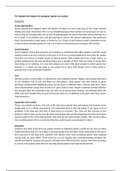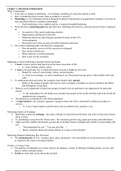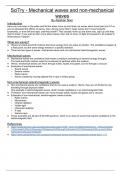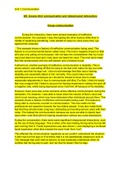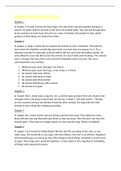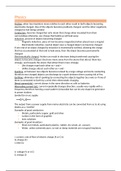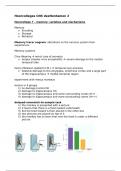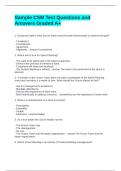,HED4808 Assignment 4 Portfolio (COMPLETE
ANSWERS) 2025 - DUE 22 January 2025; 100%
TRUSTED Complete, trusted solutions and
explanations.
QUESTION 1: (40) Critically review the dialogue above- and use
appropriate motivation to support your views. Your answer
should not be more than 5 pages long: 1.1 Motivate your
reasons why you think/ the professor’s perspective on the
content of the module is valid or not. Use literature to support
your answer (10) 1.2 Motivate with reasons too why you think
the student's perspective on addressing the content of the
module is valid or not. Use literature to support your answer
(10) 1.3 If you were in the ECD theories module- how would you
like to see the issue being resolved- that would ensure that all
epistemologies are well represented in the module. Support
your answer with relevant examples and sources (10) 1.4 Apply
your understanding of Indigenous knowledge systems by
defining it and explaining its relevance in the curriculum of
Higher Education institutions. Cite sources used in answering
the questions. (10)
1.1 Professor’s Perspective on the Content of the Module
Validity of the Professor’s Perspective:
Evaluate the professor’s stance critically by identifying whether
their perspective aligns with contemporary pedagogical trends,
curriculum theories, or inclusivity principles in education. For
,instance, if the professor argues for a Eurocentric framework, it
may conflict with calls for decolonization in education, as
emphasized by scholars like Ngugi wa Thiong’o and Molefi Kete
Asante.
Supporting Literature:
Ngugi wa Thiong’o advocates for decolonizing knowledge
systems, particularly through the inclusion of Indigenous
languages and epistemologies in education.
Freire’s Pedagogy of the Oppressed stresses the
importance of dialogical learning, where educators
acknowledge and integrate students’ cultural contexts.
Critically, if the professor’s perspective excludes Indigenous
Knowledge Systems (IKS), it may lack validity within South
Africa's higher education context, where decolonization and
cultural inclusivity are mandated by policies like the White
Paper on Post-School Education and Training (2013).
1.2 Student’s Perspective on Addressing the Content of the
Module
Validity of the Student’s Perspective:
The student's perspective can be considered valid if it highlights
the gaps in representation or inclusivity of the curriculum. For
example, if the student advocates for including African
epistemologies, their stance aligns with the UNESCO (2009)
emphasis on cultural diversity in education.
, Supporting Literature:
IKS, as defined by scholars like Odora Hoppers, includes
practices and knowledge systems rooted in specific cultural
traditions. These systems are integral to holistic education.
Constructivist theories by Vygotsky highlight the
importance of learning contexts that resonate with
students’ cultural backgrounds, supporting the student’s
perspective if they argue for practical, culturally relevant
examples in ECD.
Critically, the student's argument remains valid if it prioritizes
inclusivity and acknowledges that knowledge is not universal
but contextually rooted.
1.3 Resolution to Represent All Epistemologies in the Module
Proposed Resolution:
To ensure epistemological diversity:
Curriculum Design: Incorporate both Western and
Indigenous theories of child development. For instance,
Erikson’s psychosocial stages could be juxtaposed with
African philosophies of communal child-rearing.
Assessment: Develop assessments that allow for multiple
perspectives, e.g., comparing IKS and Piagetian theories of
cognitive development.
ANSWERS) 2025 - DUE 22 January 2025; 100%
TRUSTED Complete, trusted solutions and
explanations.
QUESTION 1: (40) Critically review the dialogue above- and use
appropriate motivation to support your views. Your answer
should not be more than 5 pages long: 1.1 Motivate your
reasons why you think/ the professor’s perspective on the
content of the module is valid or not. Use literature to support
your answer (10) 1.2 Motivate with reasons too why you think
the student's perspective on addressing the content of the
module is valid or not. Use literature to support your answer
(10) 1.3 If you were in the ECD theories module- how would you
like to see the issue being resolved- that would ensure that all
epistemologies are well represented in the module. Support
your answer with relevant examples and sources (10) 1.4 Apply
your understanding of Indigenous knowledge systems by
defining it and explaining its relevance in the curriculum of
Higher Education institutions. Cite sources used in answering
the questions. (10)
1.1 Professor’s Perspective on the Content of the Module
Validity of the Professor’s Perspective:
Evaluate the professor’s stance critically by identifying whether
their perspective aligns with contemporary pedagogical trends,
curriculum theories, or inclusivity principles in education. For
,instance, if the professor argues for a Eurocentric framework, it
may conflict with calls for decolonization in education, as
emphasized by scholars like Ngugi wa Thiong’o and Molefi Kete
Asante.
Supporting Literature:
Ngugi wa Thiong’o advocates for decolonizing knowledge
systems, particularly through the inclusion of Indigenous
languages and epistemologies in education.
Freire’s Pedagogy of the Oppressed stresses the
importance of dialogical learning, where educators
acknowledge and integrate students’ cultural contexts.
Critically, if the professor’s perspective excludes Indigenous
Knowledge Systems (IKS), it may lack validity within South
Africa's higher education context, where decolonization and
cultural inclusivity are mandated by policies like the White
Paper on Post-School Education and Training (2013).
1.2 Student’s Perspective on Addressing the Content of the
Module
Validity of the Student’s Perspective:
The student's perspective can be considered valid if it highlights
the gaps in representation or inclusivity of the curriculum. For
example, if the student advocates for including African
epistemologies, their stance aligns with the UNESCO (2009)
emphasis on cultural diversity in education.
, Supporting Literature:
IKS, as defined by scholars like Odora Hoppers, includes
practices and knowledge systems rooted in specific cultural
traditions. These systems are integral to holistic education.
Constructivist theories by Vygotsky highlight the
importance of learning contexts that resonate with
students’ cultural backgrounds, supporting the student’s
perspective if they argue for practical, culturally relevant
examples in ECD.
Critically, the student's argument remains valid if it prioritizes
inclusivity and acknowledges that knowledge is not universal
but contextually rooted.
1.3 Resolution to Represent All Epistemologies in the Module
Proposed Resolution:
To ensure epistemological diversity:
Curriculum Design: Incorporate both Western and
Indigenous theories of child development. For instance,
Erikson’s psychosocial stages could be juxtaposed with
African philosophies of communal child-rearing.
Assessment: Develop assessments that allow for multiple
perspectives, e.g., comparing IKS and Piagetian theories of
cognitive development.

